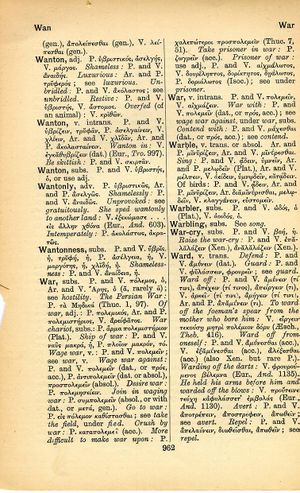ward: Difference between revisions
Λάλει τὰ μέτρια, μὴ λάλει δ', ἃ μή σε δεῖ → Modestus sermo, et qualis deceat, sit tuus → Sprich maßvoll, spricht nicht aus, was unanständig ist
m (Text replacement - "<b class="b2">Theb.</b>" to "''Theb.''") |
m (Woodhouse1 replacement) |
||
| Line 1: | Line 1: | ||
{{Woodhouse1 | {{Woodhouse1 | ||
|Text=[[File:woodhouse_962.jpg|thumb|link={{filepath:woodhouse_962.jpg}}]] | |Text=[[File:woodhouse_962.jpg|thumb|link={{filepath:woodhouse_962.jpg}}]] | ||
===verb transitive=== | |||
[[defend]]: [[prose|P.]] and [[verse|V.]] [[ἀμύνειν]] (dat.). | |||
[[guard]]: [[prose|P.]] and [[verse|V.]] [[φυλάσσειν]], [[φρουρεῖν]]; see [[guard]]. | |||
[[ward off]]: [[prose|P.]] and [[verse|V.]] [[ἀμύνειν]] (τί [[τινι]]), [[ἀπέχειν]] (τί [[τινος]]), [[ἀπείργειν]] (τι), [[verse|V.]] [[ἀρκεῖν]] (τί [[τινι]]), [[ἀρήγειν]] (τί [[τινι]]), [[Aristophanes|Ar.]] and [[prose|P.]] [[ἀπαμύνειν]] (τι). | |||
[[to ward off the foeman's spear from the mother who bore him]]: [[verse|V.]] [[εἴργειν τεκούσῃ μητρὶ πολέμιον δόρυ]] ([[Aeschylus|Aesch.]], ''[[Seven Against Thebes]]'' 416). | |||
[[ward off from oneself]]: [[prose|P.]] and [[verse|V.]] [[ἀμύνεσθαι]] (acc.), [[verse|V.]] [[ἐξαμύνεσθαι]] (acc.), [[ἀλέξεσθαι]] (acc.) (also [[Xenophon|Xen.]] but rare [[prose|P.]]). | |||
[[warding off the darts]]: [[verse|V.]] [[φρουρούμενος βέλεμνα]] ([[Euripides|Eur.]], ''[[Andromache]]'' 1135). | |||
[[he held his arms before him and warded off the blows]]: [[verse|V.]] [[προὔτεινε τεύχη κἀφυλάσσετ' ἐμβολάς]] ([[Euripides|Eur.]], ''[[Andromache]]'' 1130). | |||
[[avert]]: [[prose|P.]] and [[verse|V.]] [[ἀποτρέπειν]], [[ἀποστρέφειν]], [[ἀπωθεῖν]]; see [[avert]]. | |||
[[repel]]: [[prose|P.]] and [[verse|V.]] [[ἀπελαύνειν]], [[διωθεῖσθαι]], [[ἀπωθεῖν]]; see [[repel]]. | |||
===substantive=== | |||
[[protection]]: [[prose|P.]] and [[verse|V.]] [[φυλακή]], ἡ. | |||
[[confinement]]: [[prose|P.]] [[φυλακή]], ἡ; see [[guard]]. | |||
[[put in ward]]: [[prose|P.]] [[εἰς φυλακὴν ποιεῖσθαι]]. | |||
[[watch]]: [[prose|P.]] and [[verse|V.]] [[φυλακή]], ἡ, [[φρουρά]], ἡ, [[verse|V.]] [[φρούρημα]], τό; see [[watch]]. | |||
[[division of a town]]: [[prose|P.]] [[κώμη]], ἡ; see [[quarter]]. | |||
[[one left without parents]]: use adj., [[prose|P.]] and [[verse|V.]] [[ὄρφανος]], ὁ or ἡ. | |||
[[be a ward]], v.: use [[prose|P.]] [[ἐπιτροπεύεσθαι]]. | |||
}} | }} | ||
Revision as of 08:49, 20 May 2020
English > Greek (Woodhouse)
verb transitive
defend: P. and V. ἀμύνειν (dat.).
guard: P. and V. φυλάσσειν, φρουρεῖν; see guard.
ward off: P. and V. ἀμύνειν (τί τινι), ἀπέχειν (τί τινος), ἀπείργειν (τι), V. ἀρκεῖν (τί τινι), ἀρήγειν (τί τινι), Ar. and P. ἀπαμύνειν (τι).
to ward off the foeman's spear from the mother who bore him: V. εἴργειν τεκούσῃ μητρὶ πολέμιον δόρυ (Aesch., Seven Against Thebes 416).
ward off from oneself: P. and V. ἀμύνεσθαι (acc.), V. ἐξαμύνεσθαι (acc.), ἀλέξεσθαι (acc.) (also Xen. but rare P.).
warding off the darts: V. φρουρούμενος βέλεμνα (Eur., Andromache 1135).
he held his arms before him and warded off the blows: V. προὔτεινε τεύχη κἀφυλάσσετ' ἐμβολάς (Eur., Andromache 1130).
avert: P. and V. ἀποτρέπειν, ἀποστρέφειν, ἀπωθεῖν; see avert.
repel: P. and V. ἀπελαύνειν, διωθεῖσθαι, ἀπωθεῖν; see repel.
substantive
protection: P. and V. φυλακή, ἡ.
confinement: P. φυλακή, ἡ; see guard.
put in ward: P. εἰς φυλακὴν ποιεῖσθαι.
watch: P. and V. φυλακή, ἡ, φρουρά, ἡ, V. φρούρημα, τό; see watch.
division of a town: P. κώμη, ἡ; see quarter.
one left without parents: use adj., P. and V. ὄρφανος, ὁ or ἡ.
be a ward, v.: use P. ἐπιτροπεύεσθαι.

